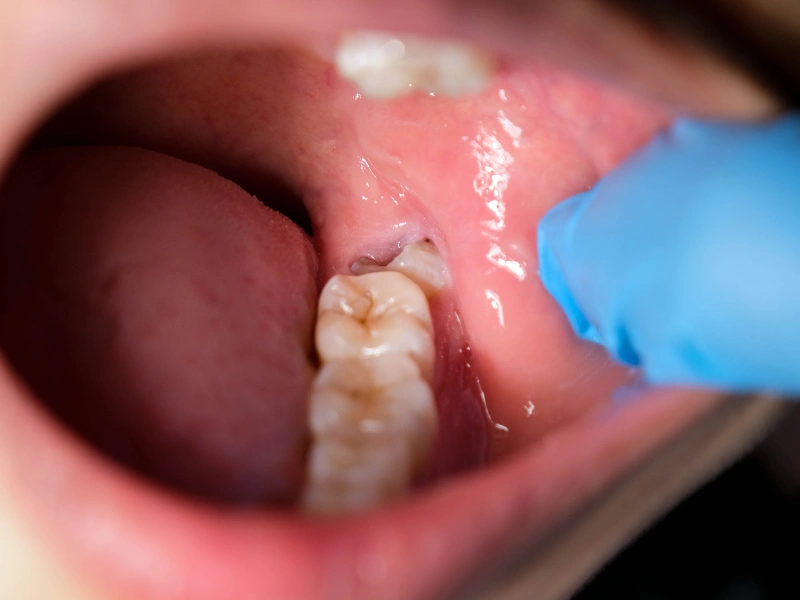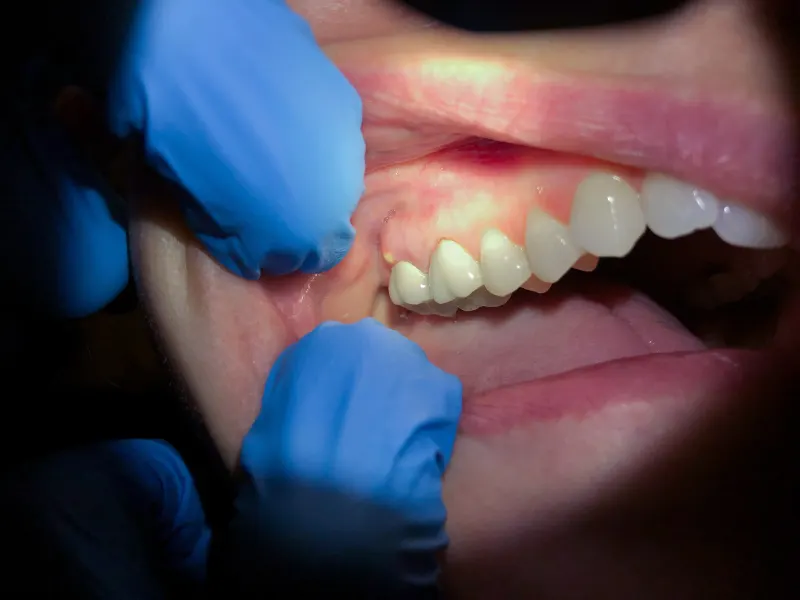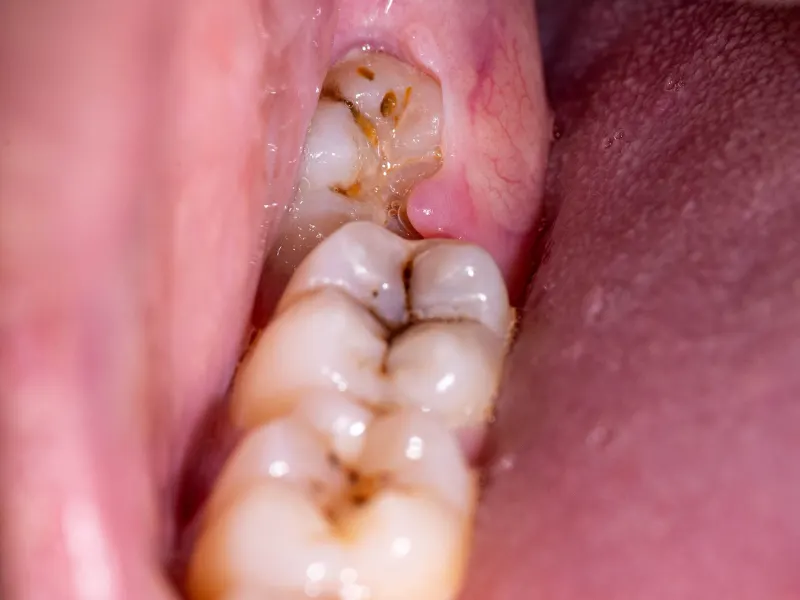
Wisdom teeth removal typically takes 45 minutes to an hour. Ready to ease your discomfort? Schedule your consultation today for a smooth procedure!
The extraction of wisdom teeth is a common dental surgery, usually done when patients are between their late teens and early twenties. This surgery is often necessary to remove teeth that could cause pain, infection, or other oral health problems.
On average, How Long Does Wisdom Teeth Removal Take? The procedure usually lasts about an hour or less, depending on how complex the extraction is. The recovery period may vary depending on the individual.
Most patients recover from wisdom teeth extraction within 7 to 14 days. During this time, the healing process of the extracted wisdom tooth begins. You may experience some discomfort and swelling, but following your dentist’s aftercare instructions can help reduce these symptoms and speed up your recovery.

There are several factors that can impact how long wisdom teeth removal takes. For instance, if the teeth are impacted—meaning they are stuck in the gums or jawbone—the procedure may take longer. Tooth decay can also complicate the surgery, as the tooth may need to be removed in smaller pieces, which can affect the overall wisdom teeth removal timeline and the results.
The positioning of your molars is another key factor. If the teeth are growing at unusual angles or are near nearby teeth, the extraction may be more challenging, which can lengthen the procedure. More complex dental procedures can influence how the extraction is performed and impact wisdom teeth extraction recovery.
Ages play an important role as well. Young adults typically heal faster because their teeth and gums are more flexible. Older patients may take a bit longer to heal due to changes in bone structure and tissue. Additionally, the complexity of the procedure can affect both the extraction and healing times.

Your dentist will start by applying local anesthesia to desensitize the surrounding tissue. This guarantees a pain-free procedure. Sedation may also be provided to help you stay relaxed if needed.
Once numb, the dentist will make small cuts in the gum tissue to access the wisdom teeth. This step is especially necessary if the teeth are impacted or not fully erupted.
If your teeth are fully erupted, the dentist will carefully remove them in one piece. If they are impacted, the teeth may need to be broken into smaller parts to be safely removed.

For a typical wisdom tooth extraction, the procedure usually takes an hour or less. This time is sufficient for most cases where the teeth are fully erupted and can be removed easily.
However, if your wisdom teeth are impacted, meaning they are trapped in the gums or jawbone, the procedure may take a bit longer. Removing impacted wisdom teeth requires extra care, which can add additional time to the process.
Your choice of local anesthesia or sedation can also affect the overall time. If you opt for local anesthesia, the process may be quicker since you're awake and relaxed. If you're given sedation to help you feel more at ease, the dentist may need a little more time to prepare you for the procedure, but the healing time will be key in your wisdom teeth healing process.

After wisdom teeth removal, the body begins its healing process right away. It's common to have swelling and mild pain, particularly during the initial 3-5 days, with symptoms typically most noticeable around day three.
The first stage of wisdom teeth recovery involves the formation of a blood clot in the socket, which helps protect the area. The gum tissue begins to heal over time, with swelling steadily decreasing. Extracted wisdom tooth healing can vary from person to person, but most people feel much better after about 3-5 days.
During the first week, it's important to follow aftercare instructions closely. This will help prevent complications like infections or dry sockets. Proper healing requires rest, avoidance of vigorous exercise, and consumption of soft foods only.
While most people can return to their normal routine after a few days, full recovery usually takes one to two weeks. By this time, the gums will have healed, but it's important to continue gentle oral care to ensure a smooth healing process.

After wisdom teeth removal, it's normal to experience some pain, swelling, and in some cases, dry socket. These are typical side effects of the healing process, but they can be uncomfortable. Discomfort typically reaches its maximum intensity in the initial 3-5 days before steadily decreasing as the wisdom tooth removal healed.
To manage pain, your dentist may recommend over-the-counter medications like ibuprofen or acetaminophen. These will provide pain relief and help reduce swelling. Applying an ice pack to your face for about 20 minutes at a time can also ease swelling and numb the area for relief.
If pain doesn’t subside or intensifies within a few days, it might be dry socket, which occurs when the protective blood clot fails to form or is lost, exposing the bone. This complication is among the potential wisdom tooth extraction complications that may arise. If you notice this, contact your dentist immediately. Following the aftercare instructions provided by your dentist will ensure a smoother recovery and minimize the risk of complications.

After wisdom tooth removal, following the right aftercare is crucial for fast and healthy healing. Start by resting and giving your body the time it needs to heal. Avoid any physical activities that could increase swelling or bleeding, especially for the first few days.
For the first few days, stick to soft foods like yogurt, mashed potatoes, and soups. Steer clear of crunchy, hard, or spicy foods that may aggravate the healing site. Gently rinse your mouth with warm salt water after meals to keep the area clean, but avoid swishing forcefully.
It’s also important to stay away from carbonated drinks and smoking during the recovery process. These can delay healing and increase your risk of complications like dry socket. By following these tips and focusing on removal of wisdom tooth aftercare, you can ensure a smoother recovery after your wisdom teeth extraction.
The procedure typically takes about an hour or less for a standard case. Complex cases may take longer.
You’ll be under anesthesia for the entire procedure, which usually lasts about an hour or less.
The procedure is performed using anesthesia, ensuring you remain pain-free throughout. Some discomfort may follow post-surgery.
The complexity of the extraction, like whether the teeth are impacted or fully erupted, affects the procedure time.
Allow the anesthesia to fully dissipate before eating. Eating soft foods during the initial recovery period helps promote proper healing.

When contemplating wisdom teeth removal, seeking professional consultation is essential for personalized assessment. At Rise Dentistry in Magnolia, TX, we're here to guide you through the entire process. Our team will ensure you fully understand the procedure, along with the recovery expectations.
Schedule your consultation today to find out if wisdom teeth extraction is the right option for you. We’ll provide personalized care and support, helping you make an informed choice. As part of our comprehensive family dentistry services, your comfort and long-term oral health are our top priorities!

EXCELLENTTrustindex verifies that the original source of the review is Google. "For years, I avoided the dentist due to my anxiety. Dr. Hassan sorathia and their team completely changed my perspective. The office has such a calming atmosphere, and the staff is compassionate and understanding. They explained every step of my treatment and made sure I was comfortable. I'm so grateful I found them and can now take care of my teeth without fear."Posted onTrustindex verifies that the original source of the review is Google. Rise was amazing! They extracted a wisdom tooth from me and the experience was completely pain free. Thank you so much!Posted onTrustindex verifies that the original source of the review is Google. I’m so grateful I found Dr. Sorathia and his wonderful staff at Rise Dentistry! From the moment I called, his office was incredibly accommodating and got me in immediately. He was professional, kind, and patient, and he truly understood my dental anxiety. I never felt rushed or pressured and he welcomed all my questions and explained each step of the process so I always knew what was happening. He made sure I understood all of my options, allowing me to make the most informed decision for my care. I left feeling comfortable, informed, and confident about my treatment. I will absolutely be returning to Dr. Sorathia and highly recommend him to anyone looking for a compassionate and thorough dentist.Posted onTrustindex verifies that the original source of the review is Google. I’m so glad I found this office! Staff is so kind and professional. They keep your comfort at the top of their priority list. Wish I had found them sooner! Can’t recommend this dentist enough!Posted onTrustindex verifies that the original source of the review is Google. Excellent Staff and Dr Sorathia very knowledgeable pleasant ambiance !Posted onTrustindex verifies that the original source of the review is Google. Had a great experience, no wait time, in and out. Everyone was friendly, informative and professional.Posted onTrustindex verifies that the original source of the review is Google. So refreshing to meet an HONEST dentist who isn’t trying to upsell you anything. Just tells you the facts doesn’t try to sway your opinion, just lays out the options based on facts and allows you to choose for yourself what works best for you. I definitely highly recommend!Posted onTrustindex verifies that the original source of the review is Google. Fantastic service! Had a bad tooth that was absolutely killing me for several days. I load going to the dentist so I don’t have a normal one. Set the appointment in the morning and got in that same day. The dentist explained saving versus extracting the tooth and 35 minutes later I was going home. He was extremely thorough and telling me what he was going to do and with the post office instructions. The staff both out front and his assistants were fantastic!! absolutely could not have asked for a better experience and he will be my dentist going forward.
© 2023-2025 Rise Dentistry. All rights reserved.